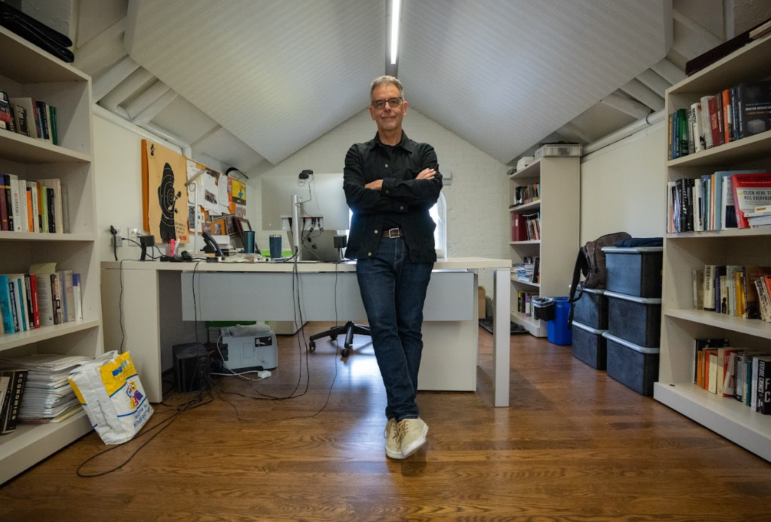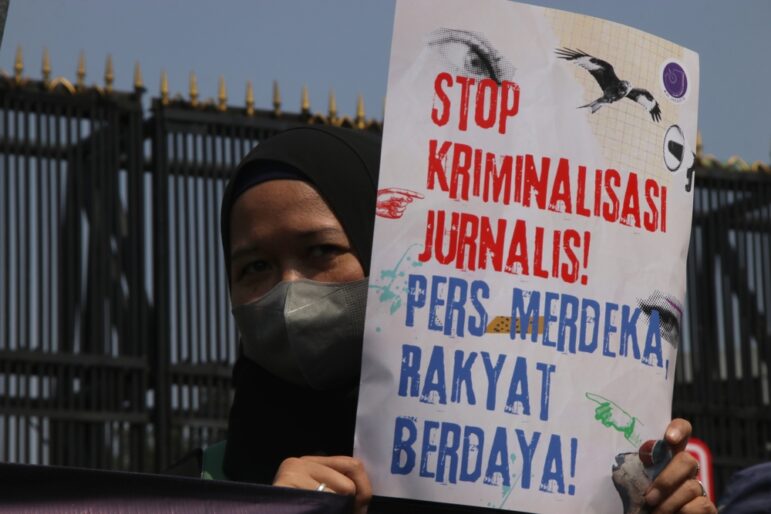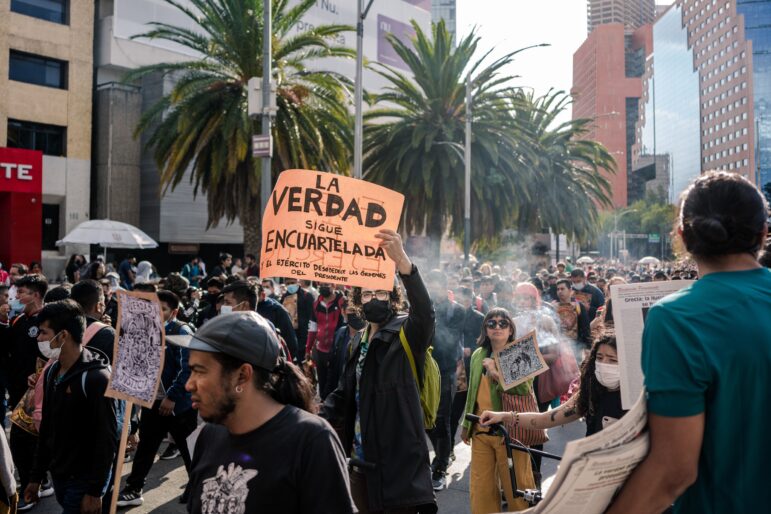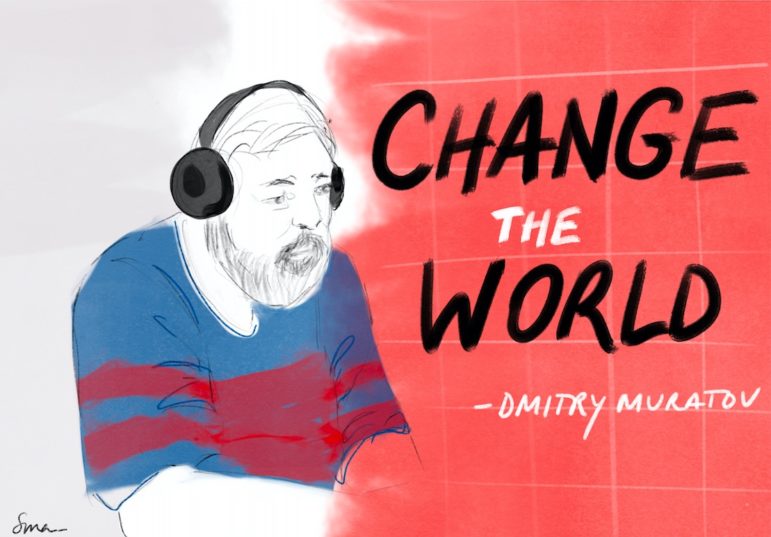

Nobel Winner Muratov: Be an Investigative Reporter, and Fight for a Better World
Read this article in
In his acceptance speech for the Nobel Peace Prize, Dmitry Muratov, editor-in-chief of Russia’s leading independent outlet, Novaya Gazeta, said: “The award today goes to the entire community of investigative journalists.”
Four days later — in a webinar interview with GIJN — Muratov set out the true stakes for investigative journalists with whom he shared that high honor: “Investigative journalism is the most important mission for humankind, because investigative reporters are not letting people steal the future from us.”
The Nobel Committee jointly awarded the prize to Muratov and Maria Ressa — founder of independent outlet Rappler in the Philippines — for “their efforts to safeguard freedom of expression, which is a precondition for democracy and lasting peace.”
Muratov spoke to a GIJN audience of 226 from 74 countries, in an hour-long session moderated by GIJN executive director David E. Kaplan and deputy director Gabriela Manuli. “I love and respect investigative journalists,” Muratov told them, “because this is a tremendous job — to work with sources and databases; to work in front of your monitor or in the field. Investigative reporters are the people who will never get this huge honor, but are the prerequisite for the survival of [human rights].”
Asked why young people should become investigative reporters, Muratov’s response was simple: to “change the world for the better.”
And asked whether this slogan should be a T-shirt, he quipped: ”I suggest a tattoo!”
At the awards ceremony in Oslo, Norway, Muratov dedicated his prize to six Novaya Gazeta journalists who were killed in the past 15 years, including Anna Politkovskaya, who was murdered in 2006.
Kaplan opened the interview with this troubling context in mind.
“Around the world today, we journalists are facing what has become an existential crisis — not just for a free press, but for democracy and human rights,” said Kaplan. “Journalists are at the front lines of this struggle — we’re being sued, we’re being imprisoned, we’re being shot at; we face unprecedented surveillance, legal harassment, and a flood of disinformation is undermining public trust in our work.”
Kaplan said Novaya Gazeta occupies the front line of this fight, thanks to its continued watchdog reporting under near-impossible conditions in Russia.
“We have followed the paper’s work for 20 years, and always been impressed with the level of watchdog reporting that it does,” Kaplan said of Novaya Gazeta. “They have done projects on corruption, human rights abuses, electoral fraud, police violence, and other abuses of power in a country where many independent outlets can simply no longer operate.”
Muratov told attendees that the time of passive event recording, seeking exclusives, and story competition with media rivals is over for independent media. Instead, he said newsrooms need to collaborate and hold the line for democratic values — and to actively seek justice for abuses, and seek solutions for problems ignored by governments.
“I would like to agree about coordinated action — professional journalists have to act together,” Muratov said.
As just one urgent example, Muratov pointed to the role of newsrooms regarding the plight of his fellow Nobel laureate, Maria Ressa, who lives under the constant threat of imprisonment under trumped-up charges in the Philippines.
“Solidarity of journalists is the key,” he said. “If now Maria Ressa, God forbid, is arrested in the Philippines, I will go to her immediately — like, immediately — I would take that flight with members of the Nobel Committee and investigative journalists. We have to express solidarity towards international colleagues instantly — we have to be there; to go to their offices; go to their prisons.”
In other words, no wringing of hands from afar, no carefully-crafted statements of concern. In repeating the word “immediately,” Muratov’s message was clear: when autocrats attempt to silence investigative journalists, their peers need to rush to the site of the persecution in person, and raise hell.
At the time of his interview with GIJN, Muratov was visiting radio journalism colleagues in his birth place — the town of Samara, on the Volga River.
Asked whether the international spotlight of the Nobel Peace Prize afforded independent media in Russia some added protection against state persecution, Muratov said he didn’t know. However, he said the award had transformed Novaya Gazeta into a perceived sanctuary for civic problems.
“There’s much more work for me now, because I personally get hundreds of emails — people are requesting help with medicine, court hearings, apartments, and childhood diseases,” he said. “This award has turned into a new job for me, and, to be honest, I’m happy with that.”
Muratov said the impact from investigative reporting — from fired officials to changed policies and influencing voters — is not only important for improving lives, but also for preserving the careers and energy of the journalists.
“When our articles do not see their outcomes, we burn out,” he noted. “The real life of an article begins after it is published or made public, so we have to get the result — if we see those results, there will be no burnout.”
However — where impact is impossible in autocratic systems — he said the mere act of reporting abuses can have an inherent benefit of raising expectations for repressed societies.
In addition to tackling corruption and mafia crimes, Muratov is campaigning against two particular horrors: prison torture, and rare childhood neurological diseases, including spinal muscular atrophy (SMA).
He has already pledged to donate all of his Nobel prize money (about US$570,000) to charities, including organizations that combat rare childhood diseases in Russia, as well as journalism foundations, like the one that gives out the Anna Politkovskaya Award.
“We want to establish an international tribunal dealing with torture — this is a terrible, ugly thing happening in prisons across the world, and in Russia all the time,” Muratov explained. “I want a global initiative that collects information about torture in different countries, so we could create an international book on torture to send to prosecutors. It can start as a journalism initiative and I think a network of international investigative journalists should take part.”
As part of his activist philosophy, Muratov floated this journalistic Robin Hood-style idea: If investigative journalists identify stolen funds that would otherwise be lost to society, then those recovered funds should be redistributed to worthy causes identified by those same journalists.
“We investigative reporters, together, have managed to uncover many mafia schemes — to find billions in corruption and mafia money — and where should it go?” he said. “My idea is that we can agree that the money can go to charities for people in dire need, or for curing children or young adults of diseases. So we would not be merely stating that some person stole something, and then they keep that money in some offshore account, but we would get it back to the people.”
Muratov said he would welcome thoughts on this notion from the investigative journalism community.
While the toll of the Russian press crackdown on Novaya Gazeta’s staff has been brutal, the outlet continues to report, and to investigate. Asked what lessons reporters in other repressive countries can learn from his team’s survival, Muratov insisted that regimes, rather than newsrooms, are the actors that need to change.
“Stand your ground — never lose your mission, or compromise,” he said. ”We have repressive authorities, but we do not change our behavior, and we stand true to our principles. Instead, it is the authority who has to change their approach. In Russia, we already have a whole generation of fantastic investigative reporters — like those at IStories, or FBK, the anti-corruption foundation, which is an outstanding project.”
For Muratov, the talent and motivation for effective watchdog reporting is likely already present in many autocratic societies — and said young people in authoritarian countries should consider that their talents might be wasted in government service. The key, he says, is for journalists to have each other’s backs.
“It’s solidarity,” he said. “What is my hope? — I hope to cooperate with the international network of investigative journalists, like GIJN.”
Referring to the small but growing global community of investigative reporters, Kaplan concluded the interview by repeating Muratov’s closing quote at the Nobel awards event: “We are the antidote against tyranny.”
Additional Resources
Why Journalists in Autocracies Should Report as If They’re in a Democracy
Reporting Facts to Power: What the 2021 Nobel Peace Prize Means for Journalism
My Favorite Tools with Russia’s Roman Anin
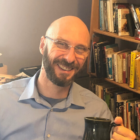 Rowan Philp is a reporter for GIJN. Philp was formerly chief reporter for South Africa’s Sunday Times. As a foreign correspondent, he has reported on news, politics, corruption, and conflict from more than two dozen countries around the world.
Rowan Philp is a reporter for GIJN. Philp was formerly chief reporter for South Africa’s Sunday Times. As a foreign correspondent, he has reported on news, politics, corruption, and conflict from more than two dozen countries around the world.






